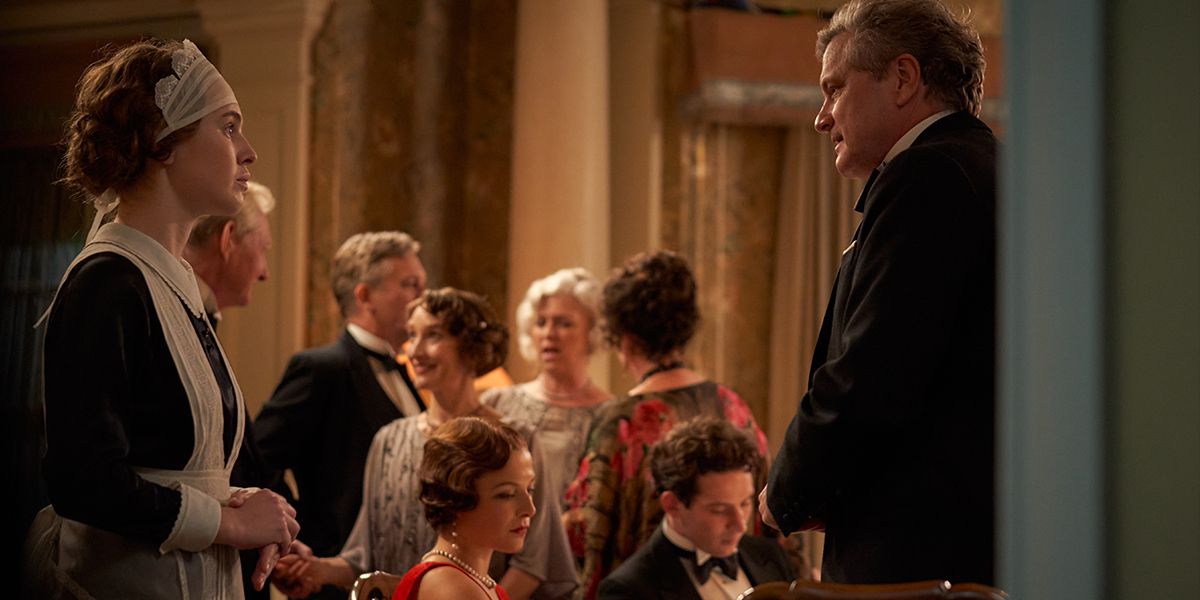Set between the World Wars, Mothering Sunday takes a more realistic and depressing approach to the upstairs-downstairs romances that have fueled the British period drama scene for decades. With World War I in the rearview mirror, Britain’s upper and middle classes are shouldering the burdens of the sons who didn’t make it home and quietly masking their sorrow behind stiff upper lips.
The film opens on March 30, 1924, on the titular Mothering Sunday. The typically joyous holiday to celebrate mothers has been cast in shades of somber hues for the three bereaved families that the story focuses on. Mr. and Mrs. Niven (Colin Firth and Olivia Colman) are trying to set aside thoughts of their dead and buried sons, but they can’t quite escape their memory as they join their neighbors Mr. and Mrs. Sheringham (Craig Crosbie and Emily Woof) for the festivities away from their homes at the estate of their friends Mr. and Mrs. Hobday (Simon Shepherd and Caroline Harker)
With the Nivens away from the manor, their staff has the day off from their duties and their maid Jane Fairchild (Odessa Young) has planned to indulge in her secret affair with the Sheringham’s son Paul (Josh O'Connor). Jane and Paul have been seeing each other in secret ever since she started working for the Nivens, but Paul’s recent engagement to the Hobday’s daughter Emma (Emma D'Arcy) threatens to put an end to their tryst permanently. While their relationship is established, Mothering Sunday frames it as something that occurred on the lark, rather than anything with real depth, though their relationship is what sets the film apart from the likes of Downton Abbey or Mrs. Dalloway. Jane and Paul’s romance seems purely built on their shared interest in copulation, though it’s hardly steamy or compelling, despite the sheer amount of flesh bared throughout.
With the survivor’s guilt of World I weighing heavily on Paul, there was room for Eva Husson’s adaptation of Graham Swift’s novel to lay bare that pain, linking it more securely to his romantic exploration with Jane. However, O’Connor’s talents are woefully underutilized in the film, despite just how much of him is laid bare. Mothering Sunday has an all-star cast of award-winners in O’Connor, Firth, and Colman, but instead of seizing an opportunity to explore nuanced grief, it opts to wallow in sumptuous sexuality, draping it in gorgeous scenery and cinematography in an attempt to support the meandering script that lacks any depth.
It’s confounding to watch a film set within a period of history that is steeped with contemporaneous anecdotes to bolster the screenplay, to help give the characters full-fledged arcs and palpable emotions, but it shirks all semblance of relatability. Even the tragedy that charts the trajectory of Jane’s existence is offered with one-note emotions trapped in the haze of reflection.
Husson does excel at capturing Jane’s transition from a wayward orphan into womanhood. She is given the space to explore her sexuality within the confines of early 20th century sensibilities, and it is refreshing to see her given the agency to engage in the relationship she has with Paul. But ultimately the script chooses to punish her for seizing upon these moments of bliss and freedom–striking down this rare opportunity for happiness. While we do see glimpses of the future she does find, following the tragedy that changes the course of her life forever, it feels frustratingly unsatisfying. And perhaps it’s because her future is that of a most-secluded writer, reminiscing about heartbreak, loss, and the innate sorrow that fuels the creative soul.
There are moments of true beauty and ingenuity throughout Mothering Sunday, but otherwise, the film feels built to impress with full-frontal nudity (from both O’Connor and Young) rather than embracing the story it wants to tell. For a period piece, it is lush with haunting post-war aesthetics, gorgeous costuming by Sandy Powell that sets the scene, and a cast that should have been able to elevate a middling script that fails to satisfy.
It’s not that Mothering Sunday is a bad film, it’s far from it, but it never reaches the echelons of true greatness that it should have been able to achieve with such a who’s who cast. It relies on shock value—the rare occurrence of atypical sensuality in period films—to sell a bleak picture of the lives of these three sorrow-stricken families in the quaint British countryside.
Rating: B-
Mothering Sunday is in select theaters.


